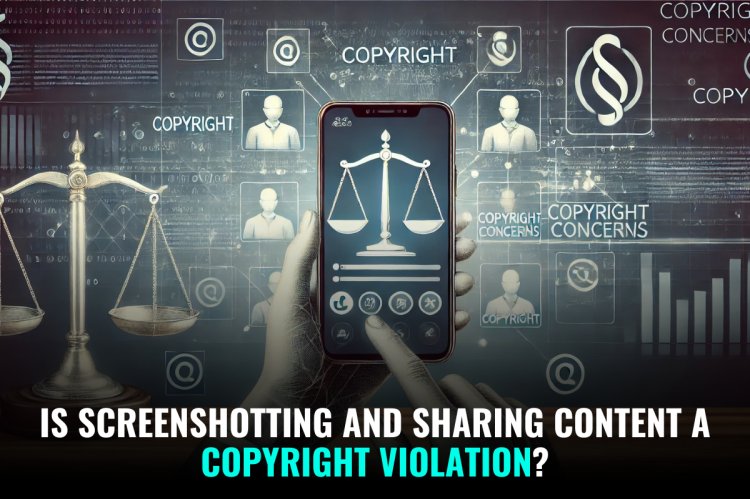IS SCREENSHOTTING AND SHARING CONTENT A COPYRIGHT VIOLATION?
This blog explores the legal implications of screenshotting and sharing content online. It examines copyright laws, potential violations, and the concept of fair use. Additionally, it provides best practices for avoiding infringement while sharing content responsibly.

INTRODUCTION
In today's digital age, taking and sharing screenshots has become second nature. Whether it's capturing a funny tweet, a compelling news article, or an insightful post from a social media platform, screenshots are a quick way to share information. But have you ever wondered whether screenshotting and sharing content might violate copyright laws?
UNDERSTANDING COPYRIGHT PROTECTION
Copyright laws exist to protect the rights of creators over their original works, including text, images, videos, and even social media posts. The moment someone creates an original piece of work and records it in a tangible form, it is automatically protected under copyright law. This means that taking a screenshot of copyrighted content and sharing it without permission could, in theory, constitute copyright infringement.
WHEN SCREENSHOTTING COULD BE A VIOLATION
1. SHARING WITHOUT PERMISSION
If you take a screenshot of a copyrighted image, article, or social media post and share it publicly without the creator's consent, you could be infringing on their copyright.
2. BYPASSING PAYWALLS OR SUBSCRIPTION SERVICES
Many websites and platforms offer content behind a paywall or require a subscription. Taking a screenshot of premium content and sharing it with others can be considered a violation of copyright law and the website’s terms of service.
3. COMMERCIAL USE OF SCREENSHOTS
Using screenshots for commercial purposes—such as in marketing materials, advertisements, or merchandise—without obtaining permission from the copyright holder is likely to be an infringement.
WHEN SCREENSHOTTING IS LIKELY FAIR USE
The concept of fair use allows limited use of copyrighted material without permission under certain circumstances, particularly for purposes such as:
1. CRITICISM AND COMMENTARY
If you take a screenshot to critique or comment on a piece of content (e.g., a meme, a controversial tweet, or a news headline), it may be considered fair use.
2. EDUCATIONAL USE
Using screenshots for educational purposes, such as in presentations, lectures, or academic papers, often falls under fair use, provided it is done in a limited and non-commercial way.
To know more about this you can follow the link below:
3. NEWS REPORTING
Journalists and bloggers may use screenshots when reporting on current events, especially when discussing the content in a newsworthy context.
4. PARODY OR SATIRE
If you modify a screenshot significantly to create a parody or satire, it could be protected under fair use. However, the transformation must be substantial and not just a minor edit.
THE ROLE OF SOCIAL MEDIA PLATFORMS
Many social media platforms have their own policies regarding screenshots and content sharing. While some platforms encourage sharing (such as Twitter’s “retweet” feature), others discourage it by prohibiting unauthorized copying or reposting. It is always best to check a platform’s terms of service before sharing screenshots of user-generated content.
BEST PRACTICES TO AVOID COPYRIGHT ISSUES
To stay on the right side of copyright law, consider the following:
• Ask for Permission – If in doubt, reach out to the content creator and request permission before sharing their content.
• Use Official Sharing Features – Platforms like Twitter, Facebook, and Instagram provide built-in ways to share content legally.
• Give Credit – While giving credit doesn’t necessarily eliminate copyright concerns, it can show goodwill and respect for the creator’s work.
• Understand Fair Use – If you rely on fair use, ensure that your use aligns with criticism, commentary, education, news reporting, or parody.
CONCLUSION
While screenshotting and sharing content is a common online practice, it is important to be aware of copyright laws and the risks of infringement. If you frequently share screenshots, understanding fair use and obtaining permissions when necessary can help you navigate copyright concerns while respecting content creators’ rights.












